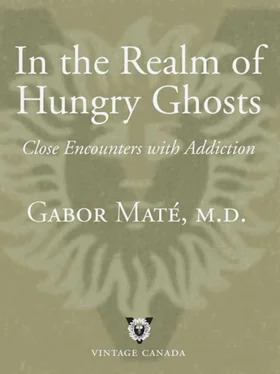The researchers in question had never made the claim that they had discovered the “alcoholism gene,” but they came close to making it. Some of their public statements fed that mistaken impression. Six years later the lead scientist, pharmacologist Kenneth Blum, published a much more subdued assessment:
Unfortunately it was erroneously reported that [we] had found the “alcoholism gene,” implying that there was a one-to-one relation between a gene and a specific behavior. Such misinterpretations are common—readers may recall accounts of an “obesity gene,” or a “personality gene.” Needless to say, there is no such thing as a specific gene for alcoholism, obesity, or a particular type of personality …Rather the issue at hand is to understand how certain genes and behavioral traits are connected. 2
What the Texas group had located was a variation of the dopamine receptor gene (DRD2) that appears more commonly among alcoholics than nonalcoholics and “confers susceptibility to at least one form of alcoholism”—or so they thought after examining the brains of a few dozen corpses. 3Even this more modest hypothesis, however, failed to stand up to future investigation. Subsequent studies were unable to confirm any association between the gene variant and alcoholism. 4“The most important finding of research into a genetic role for alcoholism is that there is no such thing as a gene for alcoholism,” writes the addiction specialist Lance Dodes. “Nor can you directly inherit alcoholism.” 5
Whatever problem we are hoping to resolve or prevent—be it war, terrorism, economic inequality, a marriage in trouble, climate change or addiction—the way we see its origins will largely determine our course of action. I present the case that the early environment plays a major role in a person’s vulnerability to addiction not to exclude genetics but to counter what I see as an imbalance. Genes certainly appear to influence, among other features, such traits as temperament and sensitivity. These, in turn, have a huge impact on how we experience our environment. In the real world there is no nature vs. nurture argument, only an infinitely complex and moment-by-moment interaction between genetic and environmental effects. For this reason, as two psychiatrists at the University of Pittsburgh School of Medicine have pointed out, “the liability trait for alcoholism is not static.” Owing to developmental and environmental factors, “the risk of alcoholism fluctuates over time.” 6Even if, against all available evidence, it was demonstrated conclusively that 70 per cent of addiction is programmed by our DNA, I would still be more interested in the remaining 30 per cent. After all, we cannot change our genetic makeup, and at this point, ideas of gene therapies to change human behaviours are fantasies at best. It makes sense to focus on what we can immediately do: how children are raised; what social support parenting receives; how we handle adolescent drug users; and how we treat addicted adults.
The current consensus—among those who accept a high degree of hereditary causation for alcoholism—is that predisposition to the disorder is about 50 per cent genetically determined. 7Equally extravagant estimates are applied to other addictions. Heavy marijuana use is said to be 60–80 per cent heritable, 8while the inherited liability to long-term heavy nicotine use has been calculated to be an astonishing 70 per cent. 9Cocaine abuse and dependence are also reported to be “substantially influenced by genetic factors.” 10Some researchers have even suggested that alcoholism and divorce may share the same genetic propensity.
Such high figures are beyond possibility. The logic behind them rests on mistaken assumptions that owe less to science than to an exaggerated belief in the power of genes to determine our lives. In genetic theories of mental disorders, “unscientific beliefs play a major role,” write the authors of a research review. 11

It’s not that genes do not matter—they certainly do; it’s only that they do not and cannot determine even simple behaviours, let alone complex ones like addiction. Not only is there no addiction gene, there couldn’t be one.
Until recently it was thought that there were one hundred thousand genes in the human genome. Even that number would have been inadequate to account for the unbelievable synaptic complexity and variability of the human brain. 12However, it has now been discovered that there are only about thirty thousand gene sequences in our DNA—even less than in some lowly worms. “Our DNA is simply too paltry to spell out the wiring diagram for the human brain,” writes UCLA research psychiatrist Jeffrey Schwartz. 13
Far from being the autonomous dictators of our destinies, genes are controlled by their environment, and without environmental signals they could not function. In effect, they are turned on and off by the environment; human life could not exist if it wasn’t so. Every cell in every organ in our bodies has exactly the same complement of genes, yet a brain cell does not look or act like a bone cell, and a liver cell does not resemble or function like a muscle cell. It is the environment within and outside the body that determines which genes are switched on, or activated, in which cell. “The cell’s operations are primarily moulded by its interaction with the environment, not by its genetic code,” the cell biologist Bruce Lipton has written. 14
There is a new and rapidly growing science that focuses on how life experiences influence the function of genes. It’s called epigenetics. As a result of life events, chemicals attach themselves to DNA and direct gene activities. The licking of a rat pup by the mother in the early hours of life turns on a gene in the brain that helps protect the animal from being overwhelmed by stress even as an adult. In rats deprived of such grooming, the same gene remains dormant. Epigenetic effects are most powerful during early development and have now been shown to be transmittable from one generation to the next, without any change in the genes themselves. 15Environmentally induced epigenetic influences powerfully modulate genetic ones.
How a gene acts is called gene expression. It is now clear that “the early environment, consisting of both the prenatal and post-natal periods, has a profound effect on gene expression and adult patterns of behavior,” to quote a recent article from The Journal of Neuroscience. 16One example is related to alcohol consumption. A certain variation of a particular gene, found in some monkeys, reduces alcohol’s sedative effects and also its disorganizing and unpleasant influence on balance and coordination. In other words, monkeys with this gene are less likely to feel semicomatose from drinking and less likely to lurch about like a drunken sailor. They have the capacity to imbibe greater amounts of alcohol without side effects and are more likely to drink until they’re drunk. However, it was found that in mother-reared monkeys the gene was not expressed—that is, it had no impact on drinking behaviour. It did so only in monkeys who had been stressed in early life by being deprived of maternal contact and reared amongst peers. 17

The overemphasis on genetic determination in addictions is based largely on studies of adopted children, especially of twins. I will not lay out here in detail the fatal scientific and logical flaws in such studies, but for those interested, I discuss them in Appendix I. The important point to explore here is how stresses during pregnancy can already begin to “program” a predisposition to addiction in the developing human being. Such information places the whole issue of prenatal care in a new light and helps explain the well-known fact that adopted children are at greater risk for all kinds of problems that pre-dispose to addictions. The biological parents of an adopted child have a major epigenetic effect on the developing fetus.
Читать дальше













